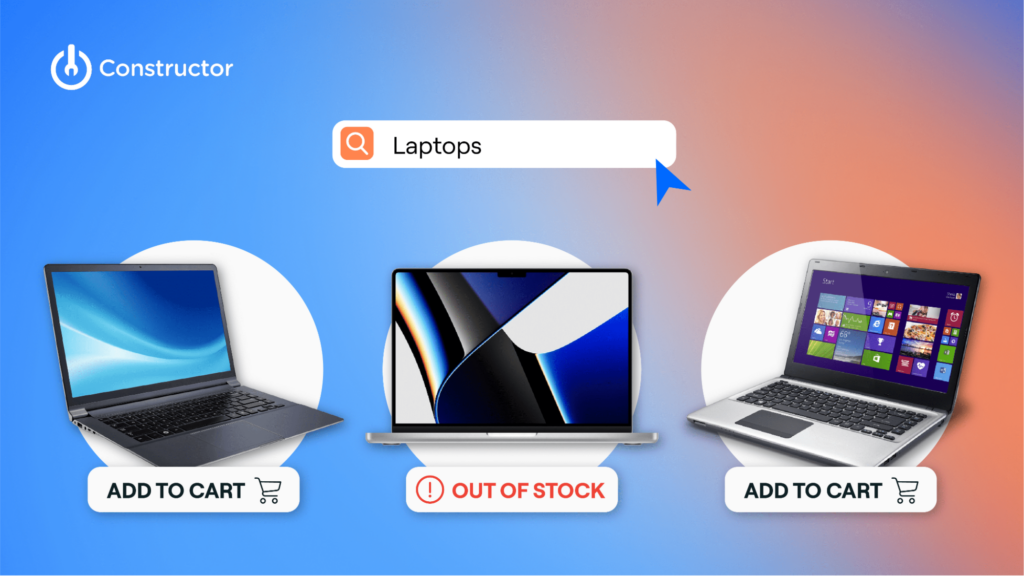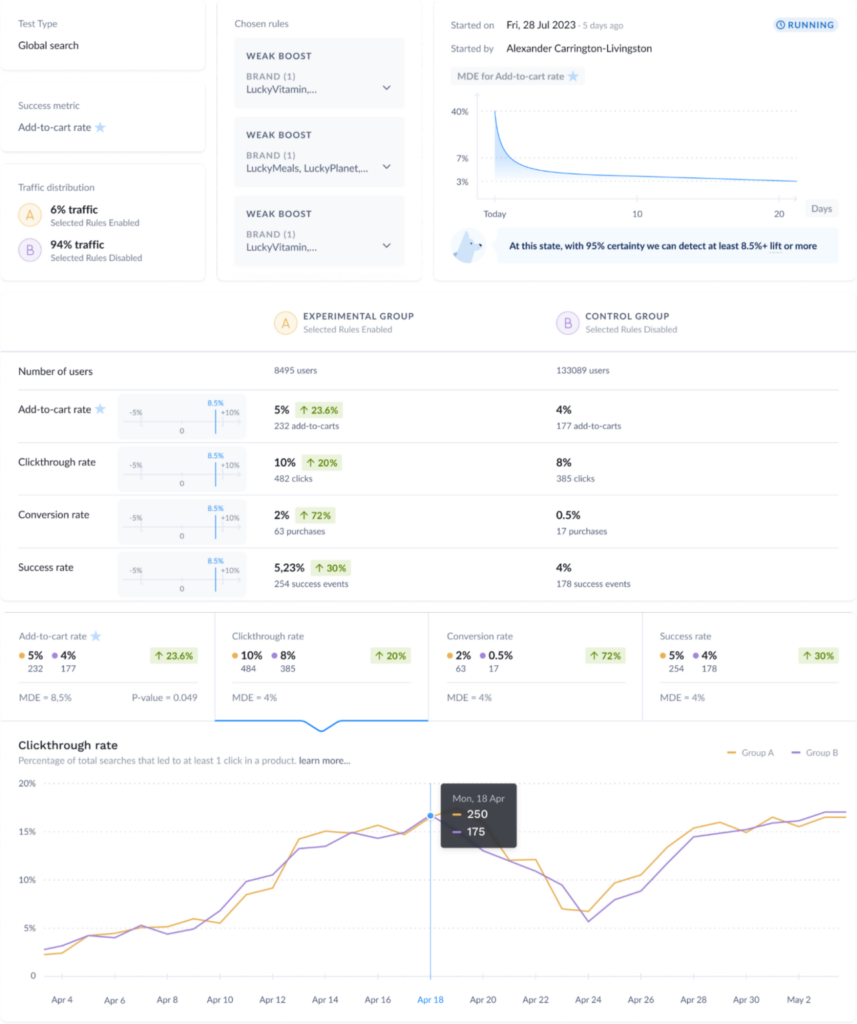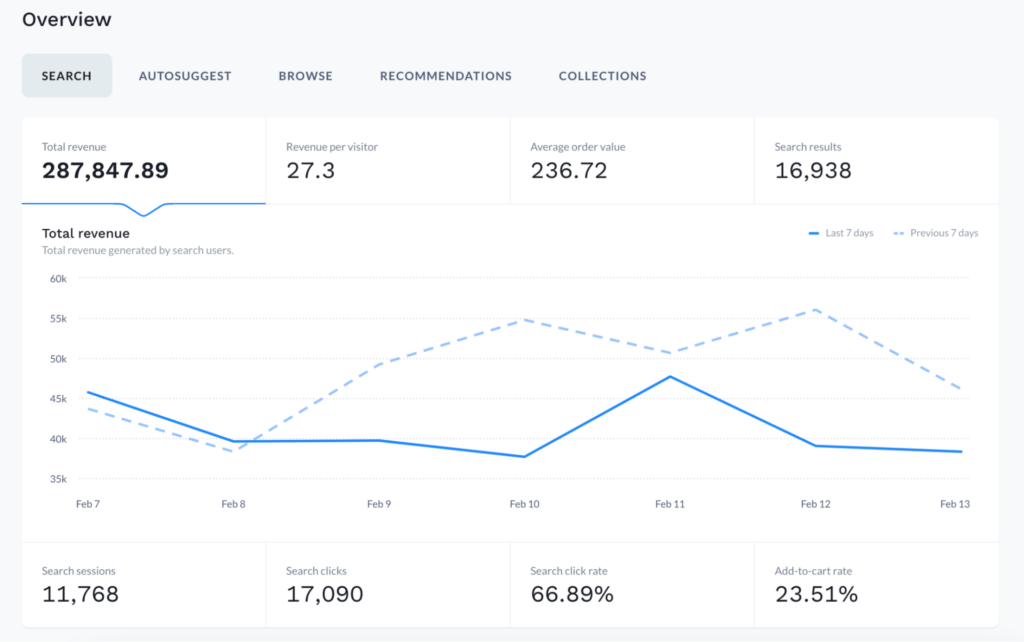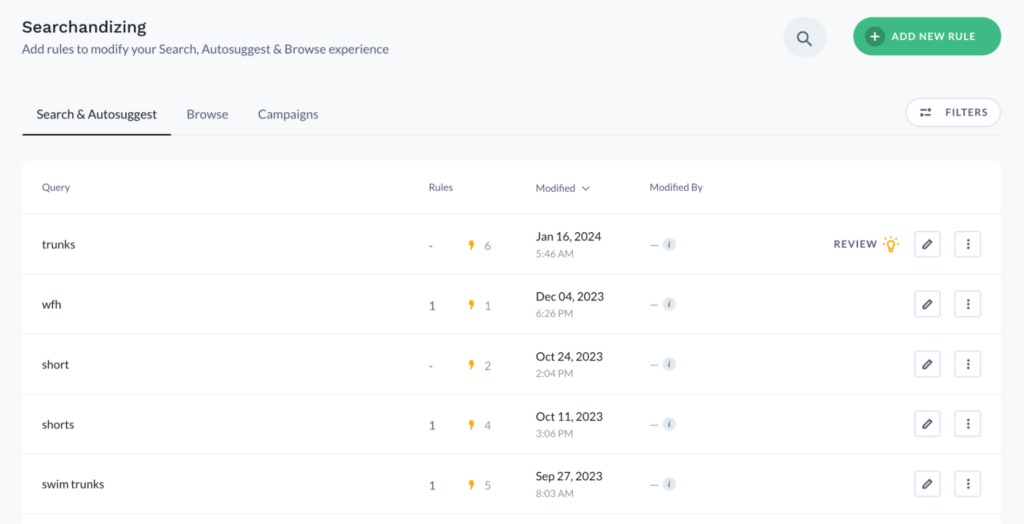Merchandisers, ask yourself this: Is your ecommerce merchandising strategy future-proof? If you’re struggling to see the impact of your merchandising decisions, the answer may be “no”. Making data-driven decisions can be a breeze when they’re guided by a modern tech stack. But without it, your business might struggle to stay ahead and adapt to evolving customer expectations.
Discover how your ecommerce merchandising decisions are only as good as the tools that guide you. They could make the difference between hitting your KPIs easily or missing them by a mile.
Table of Contents
Limitations of Your Current Tech Stack
How Better Tech Leads to Improved Merchandising Decisions
- Integrate product discovery analytics
- Automate attribute enrichment
- Collect zero-party data
- Manage everything from one dashboard
- When in need, lean on expert advice
The Future of Merchandising Efficiency Lies With Better Tech
Limitations of Your Current Tech Stack
More than half of online shoppers agree that it’s important for retailers to offer advanced site search. That means ecommerce businesses can’t afford to ignore the capabilities — and incompetencies — of their existing site search engine.
Most search engines used on ecommerce sites today aren’t built for modern ecommerce product discovery. For one, they’re built on decades-old keyword engines, such as Solr or Lucene, which can be likened to the effects of using Windows 98 to surf the internet today. It would work, but provide an extremely clunky experience.
That’s because these keyword search engines prioritize relevance above all else. Defaulting to relevance when ranking products doesn’t always guarantee a sale.
For example, imagine a shopper visits a consumer electronics website and searches for “laptops.” If the site leverages a keyword search engine, a large percentage of the available laptops will be returned, even laptops that are out of stock, have slow processors, or only receive decent reviews. Those laptops are all still relevant. After all, they’re laptops. But they’re likely not what the person is shopping for.

Keyword engines also fail to prioritize personalization and don’t specialize in ecommerce use cases, both of which provide a better product discovery experience. From a business perspective, ecommerce specialization is crucial so merchandisers can optimize product rankings for business KPIs that matter most — CTR, add-to-carts, search conversions, RPV, revenue, etc.
From a tech perspective, this focus is critical for companies who command a large market. By leveraging a platform built on a machine learning (ML) architecture in tandem with large amounts of clickstream and user behavior, they can drive more value — for themselves and customers.
All of this combined provides tangible benefits across the board, including:
- Hyper-personalizing the customer experience, which 71% of consumers expect companies to deliver.
- Allowing businesses to hit specific ecommerce goals, no matter their industry nor KPI of choice.
- Making the lives of in-house online merchandisers easier, since artificial intelligence (AI) does the brunt of the work.
With that, we invite you re-evaluate the functionalities of your current product discovery vendor and see how revamping your tech can lead to strategic, more agile decision-making for your ecommerce business.
How Better Tech Leads to Improved Merchandising Decisions
At the heart of every effective ecommerce merchandising strategy is the ability to harness the power of data.
Most merchandisers today don’t have a shortage of data. They’re often overflowing with it. What they struggle with is sifting through it all to understand and act on it. So, when it comes to improving your ecommerce tech stack as a merchandiser, better tech doesn’t just add to the data — it actually makes it usable.
See how a platform powered by AI-native software that leverages vast amounts of clickstream data as behavioral signals can help merchandisers leverage data to anticipate customer needs, forecast demand, and make strategic decisions that drive bottom-line results.
Integrate product discovery analytics
Since good decisions start with interpreting good data, it can feel like a risk to leave any form of data untouched. So, it’s common for teams to find themselves in a variety of platforms testing different touchpoints on a customer’s journey — from email platforms to PIMs, ecommerce platforms, and beyond.
In the context of product search and discovery, areas of interest for testing tend to be things like boosting and slotting rules for PLPs, landing pages, recommendation pods, and so on. When testing, merchandisers often ask themselves:
- Was my rule effective?
- Did it lead to more conversions or hit other business KPIs?
- Did it have a positive or negative impact on the business?
- How do I integrate these learnings going forward?
Unfortunately, most product discovery solutions don’t offer any follow-up insights to rule creation. And manually sifting through mounds of data is a major time-suck, something most merchandising teams are short on already.
This is where integrated analytics tools like Merchant Intelligence can help. Merchant Intelligence offers a more guided experience in deciphering data across your product discovery platform, providing AI-driven recommendations on when to stop or continue a test.

It’s also a tool that merchandisers can leverage to prove empirically that their actions are driving positive business results, and course correct when they’re not. No more operating on hunches — or worse, in the dark.
All of this trickles into business success as well, as better data-driven decisions ultimately reduce operational overhead and improve customer engagement and retention rates.
And Merchant Intelligence is the reason why merchandising teams like those at Maxeda DIY are able to more easily “find the best cocktail of rules to provide [their] customers with the best [product] results.”
Automate attribute enrichment
Thanks to the constant influx of new ideas on social platforms like TikTok, what was once “in style” for years now has a life cycle of a few months — or even just weeks, in the case of micro-trends. According to Vogue Business, over 60% of consumers appreciate when brands engage with micro-trends. Over 20% admit engaging with or purchasing products based on social media trends “very often,” and 28.9% claim to do so “often.”
Like it or not, micro-trends, fast fashion, and the like are here to stay, making financial sense for ecommerce merchandisers to find ways to adapt if they want to maintain a competitive edge.
Luckily, AI simplifies the near-impossible task for trend spotting and analysis.
Utilizing modern data science methods and customer behavioral data, Constructor’s Attribute Enrichment creates product attributes, metadata, and categories at the speed of AI: fueling the best possible product discovery experiences and leaving merchandising teams time for the strategic merchandising tasks that matter.
The tool has use outside of fashion & apparel as well. For example, a supercenter chain in the United States uses Attribute Enrichment to enrich attributes and increase coverage for most of their catalog. The solution was able to automatically populate the following attributes, listed within their respective categories:
- Concern type: age spots, anti aging, calming, psoriasis, breakage, color treated, dark spots
- Quantity: 349 pieces, 60 capsules, 55 count, 12pack
- Package size: 16.37 oz, 10 grams
- Health and wellness: kosher, organic, dairy free, paleo, halal, no artificial colors
- Gender: woman, man, unisex
- Color: aqua, mint, plum, gray, black, peach, lime, maroon, fuchsia, burgundy
- Flavor: toffee, truffle, lime, flaxseed, mango, passionfruit, hibiscus, blueberry, berry, cranberry
- Clothes and shoes size: 14, 8.5, medium, l, large, 3, 11.5
- Diapers size: 5, 3, 2, 7, 4, 1
- Baby age: 4 month, 6 month, 23 month
- Storage type: 14.8oz, 48 ozs
- Pet type: snake, guinea pig, dog, finch, bird, fish, turtle, rabbit
- Scent: vanilla, cedarwood, pear, grapefruit, mint, clove, bamboo, peach, peony, lime
Not only are the attributes created usable for filtering, but the AI-powered tool automatically enriches attributes to reflect more colloquial ways of searching — like ‘l’ for size large — which would be an attribute merchandisers typically had to add manually.
The Ultimate Guide to Searchandising with Constructor
In this comprehensive guide, learn exactly how our Search and Browse Capabilities, Merchant Intelligence, and Native Commerce Core empower merchandisers and product managers to consistently create personalized shopping experiences that don't just convert, but drive business KPIs.
Collect zero-party data
Enterprise ecommerce teams that leverage clickstream data to personalize product rankings site-wide are already saving hours of time from manual searchandising work.
But in addition to clickstream data, collecting zero-party data voluntarily from customers can paint an even clearer picture when it comes to decisions around personalization and providing a seamless product discovery experience. Extra bonus: zero-party data satisfies data privacy concerns.
Tools like Constructor’s personalized product quizzes help ecommerce businesses provide a guided selling experience that determines the answers to the most important question up front: what do our customers actually want?

Online product finders act as a trusted in-store associate, providing deep domain expertise and mimicking an in-store experience. And because product recommendations are tailored to specific customer input, return rates decrease as shoppers are more confident in their final purchasing decisions.
Depending on your product discovery platform, Quizzes answers feed into the entire shopping experience to further personalize the customer experience. So, if shoppers show an affinity for black leggings in a quiz and then continue shopping for complementary clothing items after quiz completion, black clothing items will rank higher in product results pages site-wide.
Overall, this personalization builds stronger customer relationships, which provides any company a competitive edge. Over 60% of shoppers say they’ll return to a retailer’s site in the future if retailers make it easy to find what they need.
Manage everything from one dashboard
Behind the scenes of every successful ecommerce business lies a complex web of logistical and operational challenges. Without the right tech stack in place, integrating it all can quickly become overwhelming — leading to inefficiencies, errors, and missed opportunities.
Just like merchandisers may have difficulties analyzing the effectiveness of their searchandising, those who platform-hop could also be struggling to define the following:
- Am I looking at the best source of information?
- Is there another platform that tells a different story? Is it more accurate?
- How do I coalesce these platforms into one source of truth?
- How do I coherently present these findings to executives?
If collecting, organizing, and reporting on data from multiple sources is overbearing, it doesn’t have to be that way.
One dashboard can act as a single source of truth for ecommerce merchants to manage their entire product search and discovery experience, allowing them to effectively and efficiently improve the customer experience and optimize for business KPIs.

Searchandising capabilities are also housed within the same dashboard, allowing merchants to better manage site-wide rules and act on AI-driven suggestions — without switching platforms.

When in need, lean on expert advice
Customer Success is best-of-breed ecommerce software’s secret.
When you work with a vendor whose specialty is enterprise ecommerce product discovery, you can lean into their expertise and experience to make sure you’re driving the most business value from your existing tech stack for your unique use cases, which could include, but aren’t limited to:
- Placing marketing content or value statements on PLPs, similar to in-grid tiles within product results pages.
- Properly setting up indexes to account for multiple languages, geographies, etc.
- Applying rules to certain populations via user segments.
- Exporting product discovery data to better inform marketing, ad spend budgets, etc.
- A/B testing different recommendation strategies.
With Constructor, we understand that the business and working relationship aspect to vendor partnerships is just as important as the products themselves.
That’s why every ecommerce company who decides to partner with us is assigned a dedicated support team consisting of Customer Success Managers, data scientists, and engineers — all available via a dedicated Slack channel. This premium support is included in all of our agreements, requiring no upcharge.
Our clients also have access to our curated UX libraries, containing A/B tested best practices that have led to +1% lifts in conversions for our customers. (Curious about what the improvements entail? Grab a copy of our Autocomplete UX cheat sheet for some ideas.)
The Future of Merchandising Efficiency Lies With Better Tech
In an ever-evolving ecommerce landscape, the only constant is change. From emerging technologies and shifting consumer preferences to evolving market dynamics and competitive pressures, merchandisers must continually adapt and innovate to stay ahead of the curve. And this often re-evaluating their current product discovery vendors.
A robust, flexible tech stack that’s proven to reduce manual labor by sifting through data and providing and acting on AI-driven insights is not only essential to a sound merchandising strategy, but also advancing business goals.
Download our Ultimate Guide to Searchandising to learn more about how Constructor’s AI-driven functionalities improve KPIs, team efficiency, and long-term success.
The Ultimate Guide to Searchandising with Constructor
Learn how ecommerce AI – not just any AI – improves KPIs and team efficiency.

